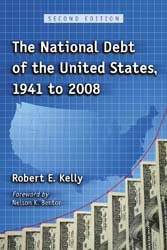 No book can be more timely than Robert E. Kelly's The National Debt of the United States, 1941 to 2008.
No book can be more timely than Robert E. Kelly's The National Debt of the United States, 1941 to 2008.Kelly, a retired CPA, corporate executive and management consultant is currently a contributing columnist to The Salem News. In this second editon, Kelly once again deploys an accountant's eye to the hard facts and government sources with illustrative tables. With the financial crisis wrecking global markets, the news is most certainly discouraging. But long before October 2008, Kelly sounded the alarm about the behemoth national debt. Before over-leveraged firms collided with the subprime disaster, Kelly paid ample attention to the debt clock.
In the past, public debt served as a handy credit card in the hands of sober political leader,s particularly in times of national emergencies when tax revenues were insufficient for the task at hand. Even President Franklin Delano Roosevelt, whom Kelly blames for redefining the role of the federal government in the lives of American, reluctantly turned to borrowing to finance World War II, mostly because tax revenues alone couldn't fund the effort. In the aftermath, Truman realized a slightly public debt less than the one he inherited. This rare, and perhaps illusory, feat was repeated by the end of Clinton's second term which, with its surplus, which enable a fleeting idea of paying down the debt. The assault on 9/11 disabused many of the resilience of new economy and its surpluses. Wars in Afghanistan and Iraq and a generous expansion of the welfare state under a Republican administration have brought us to the edge.
By Fiscal Year 2008, the United States had amassed a $9.9 trillion dollar debt, of which $5.6 trillion is owned by the public (presumably including foreign governments.) The remaining $4.3 trillion owed by "U.S. Government bodies" could theoretically be canceled out according to some observers. The "money that we owe ourselves" argument does not solve the problem says Kelly. He's worried the news will only get worse.
Kelly adeptly outlines the massive growth of public debt starting with FDR. But the real problems began with the arrival of the welfare state under Lyndon Baines Johnson, the first modern "guns and butter" president. Johnson's Great Society was the Second -- or perhaps Third -- American Revolution, a most unwelcome event.
"Shrouded though it might be in the language of compassion, Lyndon Johnson's Great Society was nothing more or less than the most recent bureaucratic quagmire, which, when successful, reduces them to the status of dependent cogs in a well-oiled centralized machine."
What came into full play during this upheaval was the rise of the American judiciary, a common theme stressed by Kelly. The activist judiciary, reading the election returns and finding socialism in the penumbra of the constitution aided the explosion of the public debt. The use of debt to finance public goods -- roads, national defense, the court system -- evolved into a blank check for welfare spending. Legislators and a few presidents resisted. But the legal march emancipated the nation from more stringent ways.
Ronald Reagan who best understood the problem at hand, that government was in fact the problem and not the solution was a mild -- if disappointing -- improvement. He had to fight the Cold War and knew that economic growth and innovation could help topple the Russian bear without so much as a direct shot. Yet the debt grew under Reagan notwithstanding arguments designed to obscure such as the debts relative size to the GDP.
The Great Society has been joined rather robustly by the Great Bailout of 2008 a paroxysm of corporate welfare that will do more than change America's attachment to now-quaint notions of limited government and free markets. The managed economy is now all the rage; the pendulum has swung violently toward a governance of "smart-set" who believe they can best allocate the scarce resources in society. Today credit markets, tomorrow consumer behavior.
A political and fiscal conservative, Kelly takes us back to the founding fathers who round out his ideal government. He ends the book with a warning from Jefferson who distrusted excess debt. "Though I am enemy to the using of our credit but under absolute necessity, yet the possessing a good credit I consider as indispensible in the present system of carrying on war. The existence of a nation to have no credit is always precarious."
George W. Bush has had the severe misfortune of making tough but wrong choices. He closes his term by launching a bailout out of the nation's foremost manufacturers in Detroit and beyond. The founder of American public debt, Alexander Hamilton could not even begin to make sense of how we are impoverishing our children today.

No comments:
Post a Comment